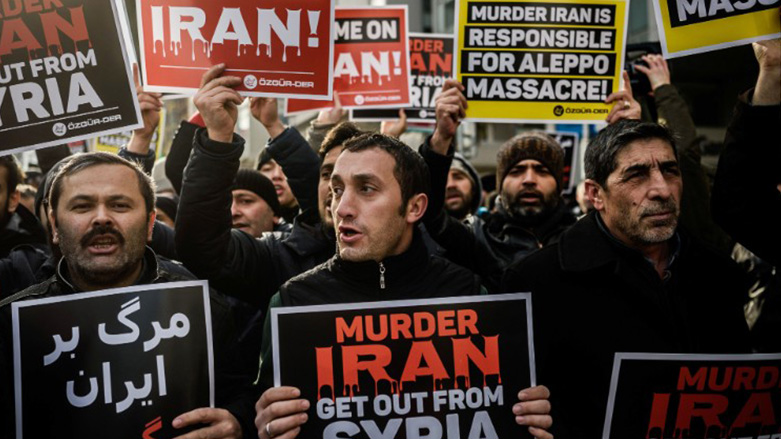US rejects Russian proposal to limit Iran in Syria

WASHINGTON DC (Kurdistan 24) - Amb. John Bolton, White House National Security Adviser, rejected a proposal from Moscow for a deal between the US and Russia to limit Iran’s presence in Syria.
Bolton met with his Russian counterpart, Nikolai Patrushev, in Geneva on Thursday, as the two aides followed up on the July 16 summit between US President Donald Trump and Russian President Vladimir Putin in Helsinki.
In fact, the two leaders agreed at the summit that such coordination between their national security staffs should follow their meeting.
Before arriving in Switzerland, Bolton spent three days in Israel, where the question of Iran, including its presence in Syria, was high on the agenda.
In Geneva, Bolton met with Patrushev for five hours. After their marathon session, Bolton held a press conference in which he explained that Iran’s presence in Syria had been “a major subject of conversation.”
“Our objective” is that “all Iranian forces” in Syria—both “regular and irregular”—return home, Bolton said.
Trump would like to withdraw US forces from Syria, but there is great concern that Iran would step into the vacuum. Thus, the idea has emerged that if Russia could ensure the withdrawal of Iranian forces, US troops could leave Syria, once the defeat of the Islamic State (IS) is complete.
In their press conference following the Helsinki summit, Trump said that he had discussed Syria “at length” with Putin. Kurdistan 24 suggested then that Trump was seeking Russia’s assistance in restraining Iran in order to withdraw US forces from Syria, and Bolton’s comments this week essentially confirmed that.
Bolton said that Putin shared the US goal of getting Iranian forces out of Syria.
Putin “told us that his interest and Iran’s were not exactly the same,” Bolton told Reuters on Wednesday, while he was still in Israel. “So we’re obviously going to talk” to the Russians about what role they can play,” Bolton said.
Addressing journalists the next day in Geneva, Bolton revealed that Patrushev had proposed “a geographic constriction of Iranian forces” in Syria “in exchange for the suspension of US oil sanctions” on Iran, which are scheduled to take effect in November.
“That was a suggestion we had rejected before,” Bolton explained, “and we rejected it again today.”
“The sanctions are coming back into effect,” he affirmed. “That’s clear.”
“We did, however, go on to discuss what other possibilities there might be,” Bolton continued, without providing any further detail.
Israel is keenly interested in engaging Russia to counter Iran in Syria, and Prime Minister Benjamin Netanyahu has visited Moscow multiple times.
“Some Israeli officials have been floating the idea of a ‘grand bargain’” under which the US “would ease sanctions” on Russia, imposed after its annexation of Crimea, “in exchange for Russian assistance addressing US and Israeli concerns about Iranian military entrenchment in Syria,” the Los Angeles Times reported, as Netanyahu paid his most recent visit to Moscow in early July, shortly before the Helsinki summit.
However, such a deal—Ukraine for Syria—seems unlikely. The US considers Europe a strategic issue, while the Middle East, historically, has not counted as such. In fact, after Geneva, Bolton headed for Kiev, where he took a strong stand against Russian aggression there.
But in Geneva, Bolton hinted at another possibility. He told Reuters that Russia was “stuck” in Syria and needed support from other countries to fund reconstruction there.
Until now, the US position has been that any international support for Syrian reconstruction—whether from the US or its allies—was contingent on a political settlement within the framework of the UN-led “Geneva process,” which, as originally conceived, envisaged the end of Bashar al-Assad’s regime.
Just last week, a senior State Department official affirmed, “Long-term reconstruction needs [in Syria] are tied very much to the political process in Geneva.”
However, in describing US objectives in Syria, Bolton said nothing about the Geneva talks. Those goals are, in his account, the enduring defeat of IS and the return of “all Iranian forces” to Iran.
So, perhaps, the White House is prepared to accept Assad’s continued rule? And help orchestrate international funding for reconstruction in Syria, even with Assad in power? In exchange, Moscow would assist in ensuring the removal of all Iranian forces from Syria.
However, as Bolton said at the press conference, following his talks with Patrushev, any deal to end Iran’s military presence in Syria “is far from easy to achieve.”
Editing by Nadia Riva
